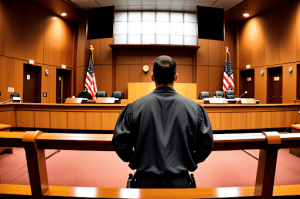Uncategorized
Can You Go to Jail for Possessing Marijuana? 5 Things to Know
Image source: Imgur
Navigating the realm of marijuana legality in the United States can feel like walking a labyrinth. With laws varying from one state to the next, what may be perfectly legal in Colorado could lead you behind bars in Idaho.
This intricate landscape necessitates an understanding of vital aspects such as medicinal versus recreational use, decriminalization, and potential punishments for illegal possession. With this, you’re better equipped to safely navigate and understand this complex topic.
Possession Penalties Across the States
While fully legal states allow recreational marijuana usage within regulated limits, ‘mixed’ or ‘illegal’ states can impose penalties for illegal possession. These consequences range from simple fines to jail time based on the quantity found and whether it’s a first offense or not.
For example, in Alabama where only medicinal marijuana is allowed, getting caught with any amount for personal use could lead to incarceration of up to a year.
Medicinal Use Doesn’t Always Shield You
In states that fall under the ‘Mixed Legal Status’, medicinal use of marijuana is permitted but the fine print matters. You might be covered if you possess cannabis due to valid medical reasons for its usage and have all necessary proof and paperwork in order.
Nevertheless, even in these states, inappropriate recreational use, crossing permissible limits, or lack of proper documentation could land you afoul of the law.
What Is a 4th Degree Felony?
Considering penalties beyond fines and misdemeanors brings us to more serious charges like felonies. For instance, what is 4th degree felony? It’s among the lowest-level felony charges applied in certain criminal cases according to some state laws.
However, when caught possessing large amounts of marijuana beyond set limits – even in legalized states – this charge could apply. In a state like Ohio, excessive possession can lead to such charges which carry severe implications such as monetary fines, potential prison time, and future legal complications. It’s crucial to explore the specific laws for any given locality in detail.
The Question of Federal Law
Although individual states have legalized or decriminalized marijuana in varying degrees, federal law still considers marijuana use as illegal. This contradiction creates a confusing legal gray area. While it’s unusual for people possessing small quantities of weed to face federal prosecution, theoretically it remains a possibility.
In Closing – Local Laws Reign Supreme
Ultimately, the rules governing marijuana usage hinge heavily on the laws of your local area or where you intend to visit with the substance on your person. Despite nationwide trends toward legalization and decriminalization, much confusion and contradiction still exist between different jurisdictions and across state lines.
To avoid being caught out by these disparities – research is critical; knowledge of local regulations could save you from an unexpected brush with law enforcement.
Fully Legal States:
Alaska, Arizona, California, Colorado, Connecticut, Delaware, District of Columbia, Illinois, Maine, Maryland, Massachusetts, Michigan, Minnesota, Missouri, Montana, Nevada, New Jersey, New Mexico, New York, Oregon, Rhode Island, Vermont, Virginia, and Washington.
Mixed Legal Status:
Alabama, Arkansas, Florida, Hawaii, Indiana, Iowa, Kentucky. Louisiana, Mississippi, New Hampshire, North Dakota, Ohio, Oklahoma, Pennsylvania, South Dakota, Utah, West Virginia, and Wisconsin.
Totally Illegal States:
Idaho, Kansas, Nebraska, North Carolina, South Carolina, and Wyoming.
* States falling under ‘Mixed Legal Status’ typically permit the use of medicinal marijuana, albeit with certain restrictions or conditions. For instance, Alabama and Arkansas allow medicinal marijuana but recreational use remains prohibited. Others like Indiana and Iowa only allow CBD oil- a cannabis product with low THC levels.
Therefore, it’s advisable to understand the specific nuances of each state’s law when it comes to medicinal allowances. You need to consider factors such as registration for medical cannabis programs, purchase limits, laws surrounding growing plants at home, and qualifying conditions for medical usage.

























